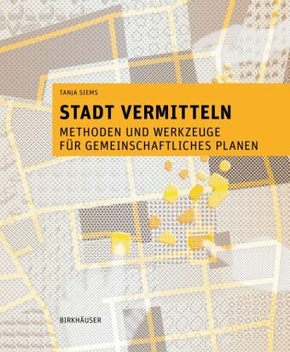
Stadt vermitteln - Methoden und Werkzeuge für gemeinschaftliches Planen
| Verlag | Birkhäuser Berlin |
| Auflage | 2023 |
| Seiten | 176 |
| Format | 23,9 x 1,7 x 31,9 cm |
| Großformatiges Paperback. Klappenbroschur | |
| Gewicht | 1046 g |
| ISBN-10 | 3035624100 |
| ISBN-13 | 9783035624106 |
| Bestell-Nr | 03562410A |
Gemeinschaftliche Stadtplanung in Forschung, Lehre und Praxis
Dieses praxisnahe Handbuch richtet sich an alle urbanen Akteure, die vielfältige städtebauliche Planungskonzepte entwickeln und umsetzen möchten. Kompetenzorientierte Anwendungsmethoden und Prozessmodelle werden von der analytischen Herangehensweise über die Konzeptstrategie bis hin zur Realisierung partizipativer Projekte dargestellt.
Im Rahmen der partizipativen angewandten Stadtvermittlung haben sich kreative und ergebnisoffene Experimente als wissenschaftlicher und praxisorientierter Ansatz bewährt. Das Buch vermittelt als Methodenkatalog konkrete und unmittelbar umsetzbare Handlungsprinzipien für eine experimentelle Stadtforschung innerhalb eines entwerferischen und planerischen Vorgehens in der Lehre und Praxis.
Disziplinübergreifende Methoden und Arbeitsweisen zur Stadtplanung Fallbeispiele aus Berlin, Düsseldorf, Köln, London, Madrid und Wuppertal Vorwort Barbara-Ann Campbell- Lange und Beiträge von Theo Lorenz, Mohamed Fezazi, Alexia Radounikli und Vera San Payo de Lemos
Collective Urban Planning in Research, Teaching and Practice
This practice orientated handbook aims at all urban actors wishing to develop and realise complex urban planning concepts. It sets out a series of techniques, methods and process models that range from analytical approaches and concept strategies to the creation of participatory projects.
Creative open-ended experiments have been proven as effective academic practice driven methods within applied participatory urban mediation. The book proposes a method-catalogue of immediately realisable approaches for experimental urban research as part of a design and planning procedure within education and practice.
Cross-disciplinary methods and working methods for urban planning Case studies from Berlin, Düsseldorf, Cologne, London, Madrid and Wuppertal Foreword Barbara-Ann Campbell-Lange and contributions by Theo Lorenz, Mohamed Fezazi, Alexia Radounikli and Vera San Payo de Lemos
